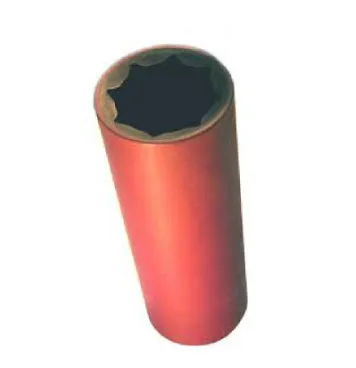Future Trends in Marine Bearings for Autonomous Ships
The maritime industry is on the cusp of a revolution, with autonomous ships poised to redefine global shipping and navigation. These vessels, designed to operate with minimal or no human intervention, demand cutting-edge technologies to ensure reliability, efficiency, and safety. Among the critical components underpinning this innovation are marine bearings. As autonomous ships emerge, the role of marine bearings is evolving, with new designs and technologies tailored to meet the unique demands of automated systems.

Adapting to the Needs of Autonomous Operations About Marine Bearings
Autonomous ships are designed to operate continuously, often in remote areas without immediate maintenance support. This requires components like marine shaft bearings to offer exceptional durability, minimal maintenance, and enhanced performance. Bearings must be capable of withstanding prolonged operation under varying load and environmental conditions without compromising efficiency.
In response, manufacturers are focusing on creating bearings that combine robust materials with self-lubricating and low-maintenance features. These innovations ensure that bearings can support the operational autonomy of vessels, reducing the need for human intervention.
Smart Marine Bearings for Predictive Maintenance
One of the most significant advancements in marine cutless bearing for autonomous ships is the integration of smart technologies. Smart bearings equipped with sensors can monitor parameters such as temperature, vibration, and wear in real time. This data is transmitted to the ship’s control systems or remote monitoring centers, enabling predictive maintenance strategies.
Predictive maintenance ensures issues are identified before they escalate, reducing downtime and preventing failures during critical operations. For autonomous ships, where human oversight is limited, this capability is indispensable, ensuring reliability and safety throughout voyages.
Advanced Materials for Enhanced Performance With Marine Bearings
Materials play a crucial role in determining the performance and longevity of marine bearings, especially in autonomous applications. Future trends indicate a shift toward advanced materials that can endure harsh marine environments while offering superior load-bearing capabilities.
Ceramic-based materials and composites are leading the way, providing advantages such as reduced weight, corrosion resistance, and thermal stability. These materials ensure bearings perform optimally under the stresses of long-term autonomous operation, even in extreme conditions like polar waters or tropical climates.
Energy Efficiency in Marine Bearings Design
Autonomous ships prioritize energy efficiency to reduce operational costs and environmental impact. Marine bearings are being designed with this objective in mind, minimizing friction and energy losses during operation.
Hydrodynamic bearings, for instance, leverage fluid film lubrication to reduce metal-to-metal contact, resulting in lower energy consumption. Coupled with lightweight materials and optimized geometries, these designs contribute to the overall energy efficiency of autonomous vessels, supporting sustainability goals in the maritime industry.
Compatibility with Hybrid and Electric Propulsion About Marine Bearings
As autonomous ships increasingly adopt hybrid and electric propulsion systems, marine bearings must adapt to these new technologies. Bearings are being engineered to handle the specific challenges of electric propulsion, such as higher rotational speeds and reduced noise requirements.
Innovative cooling solutions and advanced lubrication systems are being integrated into bearing designs to manage the thermal loads associated with electric motors. These adaptations ensure seamless compatibility with emerging propulsion technologies, enhancing the efficiency and reliability of autonomous ships.
Overcoming Challenges in Harsh Environments About Marine Bearings
Autonomous ships often operate in remote and extreme environments, from icy Arctic waters to turbulent tropical seas. Marine bearings used in these vessels must withstand these challenging conditions without failure.
Future trends point to the widespread adoption of coatings and surface treatments that improve corrosion resistance, wear protection, and durability. Diamond-like carbon (DLC) coatings, for example, offer exceptional hardness and friction reduction, making them ideal for bearings in demanding marine environments.
The Role of Marine Bearings in Autonomous Navigation Systems
Marine bearings are not limited to propulsion and mechanical systems; they also play a critical role in navigation and positioning systems for autonomous ships. Precision bearings are essential for ensuring the smooth operation of radar, sonar, and satellite communication equipment.
The development of bearings with ultra-low friction and high rotational accuracy supports the advanced navigation technologies that autonomous ships rely on. These innovations enhance the vessel’s ability to navigate safely and efficiently, even in complex or congested waterways.
-
Seal 12x20x5: Precision Radial Shaft Seals for Industrial Reliability
News Nov.24,2025
-
Seal 12x18x5: Essential Guide to Specifications, Applications & Vendors
News Nov.24,2025
-
Understanding Seal 12 20 5: Applications, Specifications & Industry Insights
News Nov.23,2025
-
Durable Oil Seal 85x110x12 – Reliable Sealing Solutions for Industry
News Nov.23,2025
-
Durable and Precise Oil Seal 75x95x10 for Efficient Machinery | YJM Seal
News Nov.22,2025
-
Durable Oil Seal 75x100x10 for Reliable Industrial Performance | YJM Seal
News Nov.22,2025
-
High-Quality Oil Seal 65x90x10 | Durable & Reliable Sealing Solutions
News Nov.22,2025
Products categories















